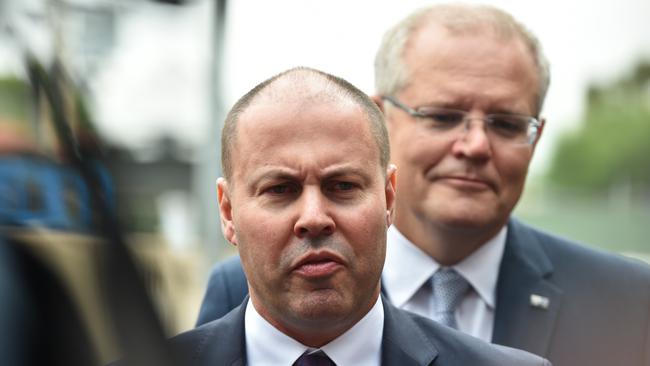
The Prime Minister and Josh Frydenberg want the debate in this election to be about the economy, and their first real shot has drawn Bill Shorten and Chris Bowen into competing claims about budget responsibility and affordable tax cuts.
While Coalition instability and disunity form the government’s core weakness, an economy producing jobs and funding tax cuts while producing the first budget surplus in a decade is its central but under-appreciated strength.
Morrison and the Treasurer face the challenge of providing real and immediate relief to families under cost-of-living pressures while protecting the integrity of a budget from claims it is an irresponsible “cash splash”.
The one-off payment for people on pensions and benefits — up to $125 and paid before the end of the financial year — is the Coalition’s first real attempt to give immediate relief to those people in most need.
It is a direct response to the Opposition Leader’s central promise to help lift wages and fight poverty through a “living wage” without apologies for taxing investors, business and those on higher incomes to pay for it.
Until now Morrison has sought to link the ability to pay for everything from costly medicines and long-term tax changes to domestic violence prevention to economic management, and hinged it all on a budget surplus.
This surplus — to be verified tomorrow — is one that Labor cannot match and Morrison and Frydenberg want that front and centre while having to address concerns about the cost of energy.
The Coalition is arguing that Labor’s promises can’t be trusted because they have to be funded by higher taxes on an economy amid signs of a slowing housing market and cooling global economy.
The one-off payment is a classic John Howard budget giveaway — it is closely targeted, is a direct payment to pensioners, will be made within weeks and doesn’t carry long-term budget implications.
It also helps to offset the fact that the Coalition’s initial tax cuts benefit people on higher incomes.
With the budget being brought down tomorrow and an election expected to be called next weekend, Morrison’s first shot is indicative of what he wants to talk about.
The responses from Shorten and Bowen to Frydenberg’s first real shot at relieving the cost of living demonstrate they too are aware of the latent appeal to voters of good economic management.
Shorten and Bowen accuse the government of a “cash splash” and both argue that Labor will provide bigger and better tax cuts to those earning less than $125,000 and that they will be funded by changes to negative gearing, capital depreciation and dividends.
Yesterday Bowen said Labor’s tax cuts were affordable because it had made the necessary changes “elsewhere” in the budget.
This is about talking up Labor’s budget credentials and highlighting the stability under Shorten, while avoiding talking about budget surplus that Labor in government couldn’t produce.
This is where Morrison wants the argument — about budget management, long-term tax changes and Labor’s record on deficit. Shorten wants the argument about the Coalition’s stability but for the next few days, crucially before the election is called, he’s going to have to address Morrison’s great big surplus rabbit out of the budget hat.




Scott Morrison has ended the phoney promises war and launched tomorrow’s budget as a targeted weapon to make economic management the centre of the election campaign.